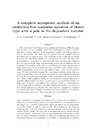Please use this identifier to cite or link to this item:
https://accedacris.ulpgc.es/handle/10553/46294
| DC Field | Value | Language |
|---|---|---|
| dc.contributor.author | Mingarelli, A. B. | en_US |
| dc.contributor.author | Pacheco-Castelao, J. M. | en_US |
| dc.contributor.author | Melkonian, S. | en_US |
| dc.date.accessioned | 2018-11-23T03:10:42Z | - |
| dc.date.available | 2018-11-23T03:10:42Z | - |
| dc.date.issued | 2010 | en_US |
| dc.identifier.issn | 1536-0059 | en_US |
| dc.identifier.uri | https://accedacris.ulpgc.es/handle/10553/46294 | - |
| dc.description.abstract | We characterize the set of solutions of a nonlinear perturbation of Bessel’s equation of order zero on a half line, where the nonlinearity is analytic in the independent variable, algebraic in the dependent variable, and, indeed, admits a pole in this variable. We show that the equation fails the Painlevé test and that there are no points in [0, ∞), where the blow-up occurs. Although we cannot find even one closed-form solution, it is shown that there are only four families of solutions: asymptotically linear and increasing, asymptotically linear and decreasing, a set of asymptotically constant solutions, and a final set of solutions that admit singularities at finite points on [0, ∞). As a consequence, we show that every solution with or without singularities on [0, ∞) is nonoscillatory and, in fact, has at most two zeros. We also show that the plane Π of real initial conditions (y(0), y′(0)) can be decomposed into a union of connected regions in each of which the solutions are exactly of one of the types mentioned above. Furthermore, we conclude that the set of initial conditions leading to asymptotically constant solutions is a piecewise differentiable curve in Π that can be estimated theoretically to a high degree of precision. In addition, the asymptotic behavior of solutions near a finite singularity is obtained. Estimates relating the growth of solutions to their initial conditions are also described and numerical examples are presented to illustrate the theory. Finally, we observe that every solution of our equation has finite singularities when considered as a solution on the whole line. | en_US |
| dc.language | eng | en_US |
| dc.relation.ispartof | Nonlinear Oscillations | en_US |
| dc.source | Nonlinear Oscillations [ISSN 1536-0059], v. 13 (2), p. 228-259 | en_US |
| dc.subject | 12 Matemáticas | en_US |
| dc.subject.other | Ordinary Differential-Equations | |
| dc.subject.other | Positive Solutions | |
| dc.subject.other | Entropy Minimization | |
| dc.subject.other | Elliptic-Equations | |
| dc.subject.other | Integral-Equations | |
| dc.subject.other | Kernels | |
| dc.title | A complete asymptotic analysis of an oscillation free nonlinear equation of bessel type with a pole in the dependent variable | en_US |
| dc.type | info:eu-repo/semantics/Article | es |
| dc.type | Article | es |
| dc.identifier.doi | 10.1007/s11072-010-0111-3 | |
| dc.identifier.scopus | 78650414829 | - |
| dc.identifier.isi | 000288432400005 | - |
| dc.contributor.authorscopusid | 6602503915 | - |
| dc.contributor.authorscopusid | 55663401500 | - |
| dc.contributor.authorscopusid | 6507951910 | - |
| dc.description.lastpage | 259 | - |
| dc.identifier.issue | 2 | - |
| dc.description.firstpage | 228 | - |
| dc.relation.volume | 13 | - |
| dc.investigacion | Ingeniería y Arquitectura | en_US |
| dc.type2 | Artículo | en_US |
| dc.contributor.daisngid | 739495 | |
| dc.contributor.daisngid | 5549935 | |
| dc.contributor.daisngid | 865241 | |
| dc.contributor.wosstandard | WOS:Mingarelli, AB | |
| dc.contributor.wosstandard | WOS:Pacheco-Castelao, JM | |
| dc.contributor.wosstandard | WOS:Melkonian, S | |
| dc.date.coverdate | Diciembre 2010 | |
| dc.identifier.ulpgc | Sí | es |
| dc.description.jcr | 0,158 | |
| dc.description.jcrq | Q4 | |
| item.grantfulltext | open | - |
| item.fulltext | Con texto completo | - |
| crisitem.author.orcid | 0000-0003-4027-8608 | - |
| crisitem.author.fullName | Pacheco Castelao, José Miguel | - |
| Appears in Collections: | Artículos | |
Page view(s)
87
checked on Jun 1, 2024
Download(s)
110
checked on Jun 1, 2024
Google ScholarTM
Check
Altmetric
Share
Export metadata
Items in accedaCRIS are protected by copyright, with all rights reserved, unless otherwise indicated.
